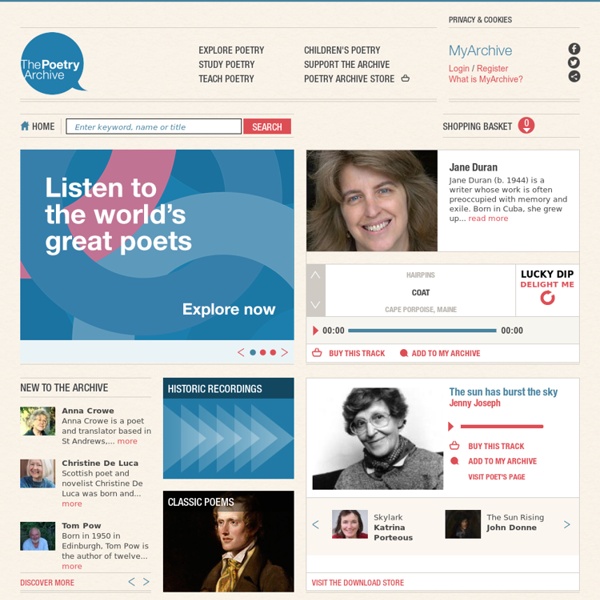



Introduction to Keats An Overview John Keats lived only twenty-five years and four months (1795-1821), yet his poetic achievement is extraordinary. His writing career lasted a little more than five years (1814-1820), and three of his great odes--"Ode to a Nightingale," "Ode on a Grecian Urn," and "Ode on Melancholy"--were written in one month. Most of his major poems were written between his twenty-third and twenty-fourth years, and all his poems were written by his twenty-fifth year. In this brief period, he produced poems that rank him as one of the great English poets.
Words and Phrases Coined by Shakespeare Words and Phrases Coined by Shakespeare NOTE: This list (including some of the errors I originally made) is found in several other places online. That's fine, but I've asked that folks who want this on their own sites mention that I am the original compiler. For many English-speakers, the following phrases are familiar enough to be considered common expressions, proverbs, and/or clichés. All of them originated with or were popularized by Shakespeare.
Nieman Foundation AP photographer Anja Niedringhaus, NF ’07, shown in a 2005 file photo, was shot and killed by an Afghan police officer on April 4. Peter Dejong/Associated Press AP photographer and 2007 Nieman Fellow Anja Niedringhaus was shot and killed April 4 by an Afghan police officer while covering the run-up to the elections. In this photo essay from the Spring 2012 Nieman Reports, the 2005 Pulitzer Prize winner, who had worked on the frontlines of many major conflicts over the past two decades, reflects on work from her 2012 book “At War.” Nature by Ralph Waldo Emerson Introduction Our age is retrospective. It builds the sepulchres of the fathers.
William Blake William Blake (28 November 1757 – 12 August 1827) is one of the six great Romantic poets, along with William Wordsworth, Samuel Taylor Coleridge, Lord Byron, Percy Bysshe Shelley, and John Keats. He is one of the few figures in history to be studied for his accomplishments in multiple fields, as he was also a printmaker and painter that holds a place in the canon for studiers of art. Blake’s most famous work is The Songs of Innocence and Experience – a volume he originally released in two parts (Innocence and Experience) but later combined. He made prints and created the volumes by hand so, while the actual copies he made weren’t widely sold, they are highly valuable. Every poem in the volume is accompanied by an image and some poems actually have different colorations that arguably change the meanings. Despite his wild political views, he actually lived a calm life.
20 Words We Owe to William Shakespeare No high school English curriculum is complete without a mandatory dose of William Shakespeare, and no American teenager makes it to graduation without whining about how boring it is to learn about iambic pentameter. As contemporary speakers of the English language, however, they might be interested to learn how much the Bard of Avon had in common with the generations that popularized the acronyms LOL and OMG and reinvented the 1940s slang term “hipster.” Endlessly imaginative and not overly concerned with grammatical convention, Shakespeare’s scripts contain over 2200 never-before-seen words—a diverse collection of loan-words from foreign languages, compound words from existing English terms, nouns turned into verbs, and creatively applied prefixes—many of which have entered into everyday language. Here are 20 examples of words we can thank Shakespeare for.
Episcopal News Service - CHURCHWIDE By Pat McCaughan, December 15, 2010 [Episcopal News Service]St. Paul's Episcopal Church in Mishawaka in the Diocese of Northern Indiana gave new meaning to the incarnation this Advent when members created "Stations of the Nativity" as a collective meditative exercise for the season. The series of fourteen 18x24-inch images begins with the explosive cosmic spark of creation depicted in John's gospel (John 1:1-18) and concludes with the visit of the magi, represented by an imposing image of Herod against a backdrop of the skulls of the innocents slaughtered during his search to find and kill the infant Jesus. The stations connected a strong parish tradition of meditating with the Stations of the Cross and an effort to incorporate members' voices, including graduate art students from the nearby University of Notre Dame in South Bend, said senior warden Jon Adamson. "To have the sanctuary change so much with these vibrant works … made it a very rich Advent," Adamson said.
Graham's English Blog: POETRY COMMENTARY - "Songs of Experience": Introduction, William Blake 4. The title of the novel refers to Pecola Breedlove's intense desire for blue eyes. She believes herself ugly and unworthy of love and respect, but is convinced that her life would be magically transformed if she possessed blue eyes. How does racial selfloathing corrode the lives of Pecola and her parents, Cholly and Pauline Breedlove? How does racial self-hatred manifest itself in characters like Maureen Peal, Geraldine, and Soaphead Church?